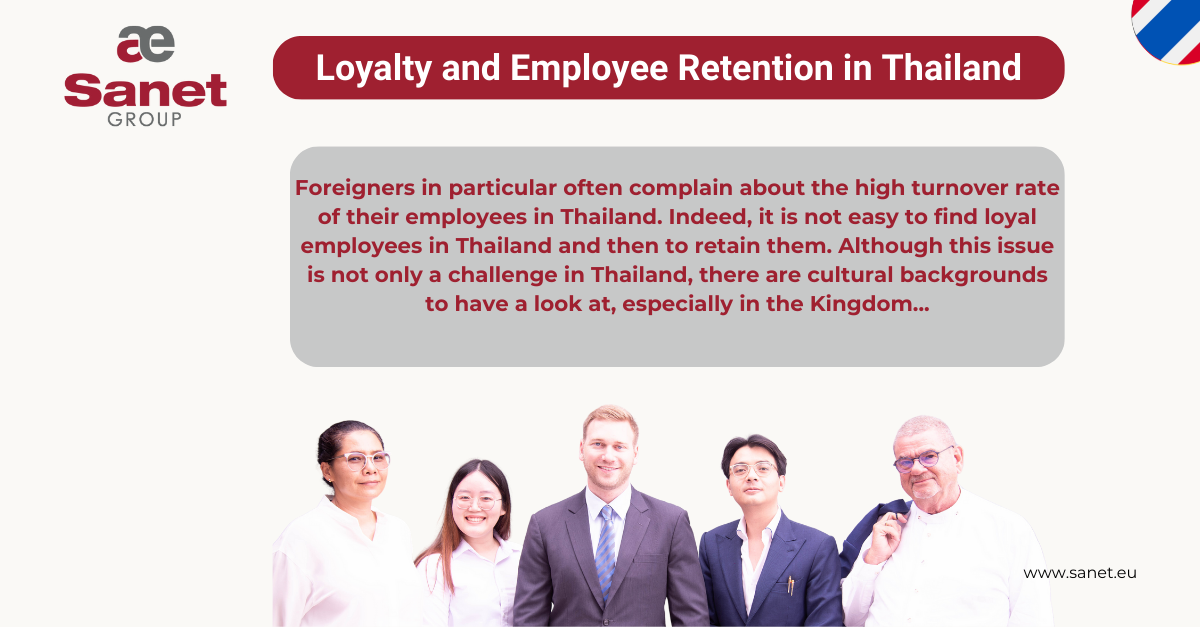Recruiting and retaining loyal employees in Thailand needs cultural sensitivity.
Particularly foreigners often complain about the high turnover rate of their employees in Thailand. Indeed, it is not easy to recruit loyal employees in Thailand and retaining them at the same time. Although this matter is not only a challenge in Thailand, there are also cultural backgrounds to have a look at, especially in the Kingdom of Thailand.
The reasons why this appears to be difficult for many people particularly in Thailand lie initially in quite banal, external circumstances. Schools and Universities tend to teach young people that their chances for career success are much better once they have gained experience in a variety of companies in a short period of time. With this precept, of course, one should not hold it against young people if they seek “new challenges” after one or two years at the latest.
On the other hand, many young people, especially in more traditionally organized companies, rarely experience that they feel needed and are important to the company. It is quite common for companies and management to shy away from transferring too much knowledge or even responsibility to their employees. They could leave the company tomorrow and then use their knowledge and experience for the benefit of a competitor.
Explanations as to why it is necessary for the employee to solve a task are also rather scarce in traditional companies. “Do the job and then come back so I can tell you what to do next!” Is not seldom the less than motivating answer to the question of “why” behind a task.
Of course, then, you don’t have to be surprised when employees “mirror” this management style and, accordingly, develop little loyalty to the company and little commitment to their job.
So what to do? Employee relationship and loyalty start with the application process and continue seamlessly in dealing with the employees. Professional recruiting firms play a crucial role in the selection process, as does HR management afterwards and during employment.
Firstly, some advice in regard to the recruitment process:
1) Let applicants experience respect. Explain that the application is not a one-way street. As the applicant strives to find a good company, so does the company strive to find good co-workers. You will be “amazed at the applicant’s amazement” at being approached at eye level like this. The position will become visibly more interesting, and the conversation will develop in a lively manner and not remain an awkward test situation.
2) Be honest. Explain why it is a win-win for both parties to have the honest intention of staying with a company longer. Ask for a commitment to 3-5 years and declare your own intention not to purposely offer a temporary employment relationship.
In fact, many rather conservative companies in Thailand tend to avoid the comparatively high severance payments after one or three years of employment by placing a time limit on the employment relationship or quickly giving notice shortly before the time limits are reached.
Make it clear that Western companies in particular – similar to the Japanese – derive their success from employees often working for the company for many years and sometimes even advancing “from trainee to manager”. No one, however, wants to invest time and money in training someone without the hope that this investment will pay off in the long run through the loyalty and expertise of the person being groomed.
3) In the case of more senior or experienced employees, of course, check their resumes carefully. For example, Sanet CREATING CAREERS has the policy that candidates who have left the company more than twice in their career before reaching the two-year mark will only be shortlisted if this is balanced by significantly longer employments or very special knowledge and skills.
In any case, however, applicants need to provide conclusive reasons for any change in their career. Of course, we must also accept a candidate openly admitting that he or she changed jobs at a young age because of a significantly higher salary or a significantly better position.
Personal advantages are not a crime, but they should not be the focus of career development either. Once it has been possible in this way to at least create understanding and respect among new employees for the company’s interest in long-term cooperation, this success must also be consolidated without rupture in daily dealings with each other.
Each manager knows or should know that remuneration for this purpose is certainly a question of “hygiene”. Of course, an underpaid employee will soon look around for something better. But overpayment as well rarely creates loyalty. People will always criticize others to whom they act unfairly in order to justify their own actions. Those who perform below what they are paid will seek justification in criticism against the company.
Every entrepreneur should also know that regular appraisals and career discussions put the employee on a stable “track” to work towards achieving a set goal. Getting him off this track usually takes more than a couple of Thai Baht.
A third point that every entrepreneur should take to heart in his efforts to retain employees is especially important in Thailand.
The employee must feel comfortable in his environment. He wants to work with colleagues he appreciates and with whom he also gets along well outside of work. Of course, this must be taken into account when selecting personnel. Sound recruitment agencies do not simply propose the best candidate, but rather the person who can develop the best skills in the specific team.
The strength of this “togetherness” can be felt even when an employee is dismissed, who may have met with harsh criticism from colleagues here and there because of poor performance. At the moment of dismissal, sympathy with colleagues clearly takes precedence over understanding for the company’s decision. On the other hand, joint excursions, dinners or other activities are an important instrument for promoting “togetherness” or “well-being. However, the boss need not always be present until the end of the event, and in any case should not “fraternize” inappropriately. The employees then also want to be among themselves for once, and the drunken boss earns anything but respect in Thailand.
To all points already mentioned above applies in addition in Thailand completely particularly:
1) Communicate very precisely why you dismissed a coworker in a particular case and why there was no other way. Of course, this may be handled by a good HR manager. However, it must never be forgotten if the impression of unfairness or lack of appreciation for the employees should not be created.
2) Be careful with criticism! It is always taken personally. Criticism about a result or a procedure is generally associated with personal failure and declining esteem. As soon as the content-related criticism is accepted or at least visibly recognized by the employee, pivot: Now it’s time to motivate and point out the employee’s otherwise impeccable and valuable role.
3) Make employees proud of their company. Having great brands of course makes it easier in this regard. With Siemens or Toyota on the T-shirt, pride comes naturally. But good brand and image building is also doable for smaller companies. Training, courses, certificates, company logos on clothing and modern office technology underline the value of the employee and the image of the company.
4) Avoid irony, even if it is meant to be fun and humorous. This applies both towards employees and towards yourself. Like most Asians, ironic remarks are quickly taken literally in Thailand: “I can’t understand that anymore, I’m probably too stupid for that!” causes employees – although meant ironically – to believe that their boss has just admitted that he is not the master of the situation anymore and lacks knowledge and competence.
In the same way, employees are often deeply offended by a joking exaggeration of a mistake or e.g., by a non-serious threat of dismissal. It is therefore not uncommon to hear Thai employees immediately follow up with “just kidding” when such a statement slips out.
In summary, it can be said that Thai employees can be at least as loyal as employees in Germany and Japan. A major role in this is played by personnel consulting during the recruitment process and by a skilled HR Manager in operations.
But the foreigner as “boss” can also make a decisive contribution to loyalty if he combines his competence with respect.
This is true even if you sometimes “fly off the handle” in view of the cultures’ different ways of thinking. Then it is important to either have a “cultural ambassador” in the company explain the reason for the upset. Or you find the courage to point out in a conciliatory manner after the storm has passed that it is precisely your own, less Buddhist culture that sometimes makes the “farang” (Western foreigner) explode, but in the end always makes him conciliatory.
It’s very “humanizing” in Thailand, with all the upsides and downsides.

